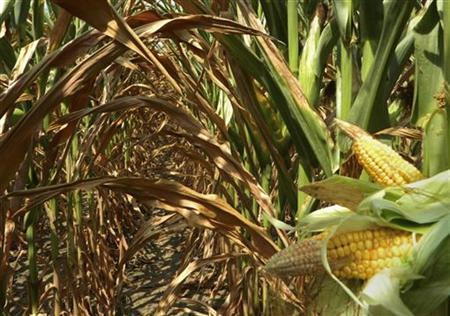Drought bill may carry mammoth farm bill into law
Date: 27-Jul-12
Country: US
Author: Charles Abbott

Drought-damaged ears of corn and dry, brown stalks are seen in a
field near Georgetown, Illinois July 24, 2012.
Photo: Karl Plume
A comparatively low-priced disaster bill for livestock producers hit by the worst drought since 1956 may be the ticket to passage for a $500 billion farm bill now in limbo in Congress.
Republican leaders in the House of Representatives scheduled a potential vote for next week on disaster relief. Farm and environmental lobbyists said the vote could create a path to enacting the farm bill although there was no agreement among House Republicans on the scope of the legislation.
Two-thirds of the continental United States was under moderate to exceptional drought with 40 percent of U.S. counties declared agricultural disaster areas. While crop insurance will aid many growers, livestock producers with drought-stunted pastures face skyrocketing feed prices.
The Obama administration has opened environmentally fragile land, normally off-limits, for haying and grazing to provide an emergency supply of forage but can do little else. Programs that allowed the Agriculture Department to share the cost of livestock feed or to help fruit, vegetable and tree farmers expired at the end of 2011.
"I do believe the House will address the livestock disaster program that unfortunately in the last farm bill was only authorized for four years," said Speaker John Boehner, the top House official. He said Republican leaders were working with the Agriculture Committee "on an appropriate path forward."
Republican leaders are sitting on a five-year House farm bill that faces so much opposition that it could be defeated if put to a vote. Some Republicans say it needs more reform and more spending cuts. Democrats oppose the bill's $16 billion in cuts in food stamps for the poor. The bill would save $33 billion over 10 years but boosts crop support prices.
While a stand-alone disaster bill was possible, some farm lobbyists said disaster aid could be wrapped into a one-year extension of the 2008 farm law, which expires on September 30.
In either case, it could open the door for a House-Senate compromise on farm subsidy reform and enactment of a long-term bill this year, said lobbyists.
Senate Agriculture Committee chairwoman Debbie Stabenow said she was willing to make a legislative sprint to complete a farm bill in the coming weeks. The Senate has passed a bill to cut spending by $23 billion and replace almost all traditional farm subsidies with a new approach that protects farmer revenue against poor yields and low prices.
"If the House intends to send us a bill that will be used to negotiate the farm bill during August, I am open to that approach," said Stabenow. She said a short-term extension of current law is a bad idea that would wipe out farm reform.
House Republican leaders would have to agree for that approach to work, said Dale Moore of the 6 million-member American Farm Bureau Federation, which seeks a five-year farm bill.
House Majority Leader Eric Cantor said a vote was possible next week on "programs related to disaster assistance under the expiring farm bill legislation." He declined to say when the House would vote on the overall farm bill.
Disaster aid could cost from $300 million to a couple of billion dollars, depending on the terms of assistance and if it will cover crop losses, too. The House farm bill, for example, would pay farmers up to $125,000 in aid.
Steny Hoyer, the assistant Democratic leader in the House, said Republicans would defer action on a full-length farm bill because they "could not get their act together."
A short-term extension was a distasteful possibility for some activists. Lawmakers resorted to six extensions of farm law until they completed the 2008 law, a year later than planned.
"I think it's going to be an extension bill with disaster relief as a fig leaf to move it forward," said Ferd Hoefner of the National Sustainable Agriculture Coalition, a small-farm advocacy group.
The Environmental Working Group said a one-year extension of current law would postpone "long over-due reform of crop insurance subsidies." After explosive growth, the federally subsidized crop insurance program costs nearly twice as much as the $5 billion a year "direct payment" subsidy that is a prime target of reformers.
While the drought focuses attention on farmers, "the connection is slim" between disaster aid and a broad-scale farm bill, said Pat Westhoff, at a University of Missouri think tank.
Written every few years, farm bills set terms for crop subsidies, food stamps, agricultural research, farm exports, food aid, biofuel development and rural economic programs.
(Editing by Neil Stempleman, David Gregorio and M.D. Golan)
![]()
© Thomson Reuters 2012 All rights reserved